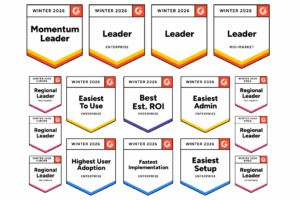What New Accounting Grads Really Want in a Job
Blog post
Share
It’s no secret the accounting profession is experiencing a global shortage of talent. Because of this, many accounting teams today are understaffed, with employees experiencing burnout and questioning their future in the field. As a result, attracting new talent—particularly fresh accounting graduates—has become essential.
However, the critical question isn’t just, “How do we attract these graduates?” but rather, “How can we become more attractive to them?”
We are recruiting a new generation of accountants. Today’s college students—primarily members of Gen Z—desire flexibility, professional growth opportunities, stability and job security, access to modern technology and tools, and work-life balance. Accounting excels in some of these areas, others—not so much.
Accounting’s Reputation: What Attracts & What Repels New Grads
Let’s take a closer look at some of the defining characteristics of accounting and how they resonate (or don’t) with today’s new graduates.
1. Stability & Job Security
Why It’s Appealing:
This is perhaps one of the strongest selling points for young professionals entering the workforce. In a time when industries can be disrupted overnight by technology or economic shifts, accounting offers a reassuring level of job security. There will always be a need for professionals who can navigate tax codes, ensure regulatory compliance, and deliver financial insights.
Where It Falls Short:
While job security is attractive, it’s not enough on its own. If stability comes with burnout-level hours, outdated systems, and limited flexibility, the trade-off may no longer be worth it.
2. Long Working Hours & Burnout
Why It’s a Turn-Off:
The notoriously long hours during “busy season”—often 60 to 80 hours per week—particularly at large accounting firms, remain one of the biggest deterrents for young professionals. Gen Z highly values mental health, flexibility, and personal fulfillment, and won’t hesitate to prioritize these aspects over traditional success metrics.
The Fix:
Firms that prioritize automation, data analytics, and cloud-based systems—and involve junior employees in tech adoption—will gain an edge.
3. Clear Career Path & Highly Transferable Skills
Why It’s Appealing:
The structured progression of accounting careers—from staff accountant to senior, manager, and partner—can be reassuring to those who crave direction and measurable milestones. The skills gained through public accounting or corporate finance roles are also incredibly transferable, whether one chooses to move to similar roles in a different industry or seek new opportunities in consulting, tech, finance, and entrepreneurship.
Areas for Modernization:
The path is clear, but not always flexible. Some firms expect employees to “pay their dues” through grueling early years with little say in project types or career direction. Offering lateral mobility or alternative leadership tracks can make firms more attractive to this audience.
4. High-Pressure, Deadline-Driven Work
A Double-Edged Sword:
Some graduates thrive in fast-paced, results-oriented environments—especially those who are analytical and goal-driven. However, many new grads today are wary of roles that prioritize output over well-being. While pressure comes with the territory in accounting, how it’s managed makes all the difference. Firms that support their employees through high-stress periods—through technology, flexible hours, or mental health resources—will stand out.
5. Hesitance to Adapting Change or Embracing Technology
Why It’s a Problem:
This is a deal-breaker for many young professionals. Gen Z grew up with intuitive tech and fast innovation cycles. If the tools they’re using in the workplace feel clunky, outdated, or inefficient, they’ll quickly become disengaged. Worse, it can make them feel like they’re not growing or staying competitive in the job market.
The Fix:
Firms that prioritize automation, data analytics, and cloud-based systems—and involve junior employees in tech adoption—will gain an edge.
6. Respectable Profession with Decent Earning Potential
Why It’s a Mixed Bag
There’s a sense of pride in becoming a CPA or finance professional—one built on years of academic and professional rigor. But for many grads, the return on investment is in question. CPA licensure can cost thousands of dollars in prep, fees, and time—often unpaid. If starting salaries and long-term compensation don’t outweigh those costs, grads may opt out entirely.
To Stay Competitive:
Firms should consider offering CPA exam support (financial and logistical), signing bonuses, and pay bumps for licensure. More importantly, they should openly address the value of the credential—how it leads to meaningful career progression, not just an extra few letters on a résumé.
To CPA or Not to CPA?
In the midst of an ongoing accountant shortage, the CPA licensure process is under increasing scrutiny. The requirement to complete 150 credit hours, often necessitating a fifth year of education (and cost), feels out of step with Gen Z’s concerns about student debt and return on investment. As a result, there’s growing support for alternative pathways—such as 120 credit hours combined with two years of experience—that offer more flexibility without sacrificing quality. But today, some entering the accounting field are hesitant to get licensed at all.
This stems from a broader trend: many younger professionals are opting for private sector roles where CPA licensure is not a necessity. It’s common to see new grads spend a few years at a public accounting firm—often to gain resume-building experience—before transitioning into more flexible, higher-paying corporate or tech roles that don’t require the credential.
For Gen Z, accounting’s appeal hinges on stability combined with flexibility, adaptability, and genuine opportunity for growth. The profession must evolve its practices to meet these expectations, ensuring it attracts and retains the talented new accountants it needs to thrive.
Written By: Lindsay Rose


